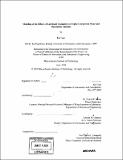Modeling of the effects of lubricant chemistry on engine component wear and parametric analysis
Author(s)
Liao, Kai, Ph. D. Massachusetts Institute of Technology
DownloadFull printable version (33.56Mb)
Other Contributors
Massachusetts Institute of Technology. Dept. of Aeronautics and Astronautics.
Advisor
Victor W. Wong.
Terms of use
Metadata
Show full item recordAbstract
Recently, due to the strengthened regulations on diesel engine emissions, the dynamic understanding of engines' antiwear processes has drawn renewed attention. Oil additives can help engines resist wear by forming a thin solid layer of antiwear film, and zinc dialkyldithiophosphate (ZDDP) is the most commonly used oil additive. There has been sufficient experimental effort in trying to understand the dynamics of ZDDP antiwear film formation and its effect on wear between engine components, but the effort of predicting antiwear film formation and the effect of lubricant chemistry on engine wear through modeling has just begun to emerge. The purpose of this research is going to improve such a model modeling ZDDP antiwear processes so that it can be used to understand the dynamics of antiwear film formation at different operating conditions, and use this model to gain insight into the antiwear film formation processes. The effect of different processes on antiwear film formation and the sensitivity of the film formation to different parameters have been demonstrated and analyzed.
Description
Thesis (S.M.)--Massachusetts Institute of Technology, Dept. of Aeronautics and Astronautics, 2009. Page 75 blank. Includes bibliographical references (p. 71-72).
Date issued
2009Department
Massachusetts Institute of Technology. Department of Aeronautics and AstronauticsPublisher
Massachusetts Institute of Technology
Keywords
Aeronautics and Astronautics.